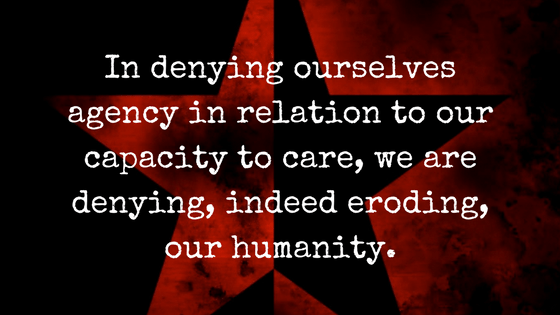By Aisha Raees


Henry killed a man and caused the death of two young women in his high school. He is in jail. What is wrong with that?
Our laws reflect ethical commitments to justice but in Henry’s case, they reveal a flaw in the foundation of these commitments.
A 15-year-old immigrant from El Salvador came to Long Island to escape the formidable MS-13. He was drawn into the gang at 10. At 12 he was asked to kill—or be killed. He spent a year in the U.S. almost outrunning the shadow of his choice to kill. ProPublica reports, that, he was soon recognized by his gang in Long Island and pressured to report on rival gang members. This led to the death of two of his classmates.
Duty, life, death. Desperate to break this cycle, he wrote what happened and shared with a teacher. His teacher followed school policy and called the police. The police sent his file to the FBI. The FBI forwarded his file to ICE. Today, he finds himself in detention with members of the same gang he wanted to escape—his hope slammed shut in a void of judgment.
The law of the gang and the law of this land, both led him to the same place, with the same people, facing the same possible outcome—death.
Both laws are grounded in a careless ethics glorifying justice. This overemphasis allows us to justify procedure and policy over concern for individuals involved. In both cases authority wins over relation.
I am a professor of philosophy and we discussed Henry’s case in my ethics class. We talked about the assumption that being fair is equal to being just and being just is morally right. This equation is difficult to unpack. Most felt sad for Henry but were inclined to uphold the law, stoically stifling their care—it’s only fair that he pays for the deaths he caused. Justice is charismatic. Caring is fluff, inconsequential fluff.
Arguments giving weight to care are uncommon but essential for justice to have any meaning. Scholars Nel Noddings and Carol Gilligan have pioneered arguments for an ethics of care for some time now—our laws need to catch up.
Laws ideally reflect consensus and for our collective sense of right and wrong to shift, we need to redress the obsolete disconnect between justice and caring. The false dualism of reason and heart is stalling our ethical development. Caring is the opposite of fluff—it is a call to be more rigorous. Caring requires labor, patience, and time. Ubiquitous metaphors that value justice over caring run deep and they lie at the heart of our vindication of Henry.
Should we care about Henry? Should we care about the girls who lost their lives? Does following policy absolve us of moral responsibility? Should he be deported? Does he deserve witness protection? Is he a criminal?
What do we owe Henry?
These questions require us to be clear about the source of our ethical claims.
I am afraid that soon we will forget that we possess this substance. In denying ourselves agency in relation to our capacity to care, we are denying, indeed eroding, our humanity. Justice as the empty consequence of a law lacking substance, will destroy Henry and anyone like him. We should care about this emptiness that is threatening to swallow our humanity. We should care about Henry.
***
Aisha Raees, Ph.D., teaches philosophy at the Arrupe College of Loyola University Chicago and is a Public Voices Fellow with The OpEd Project.


